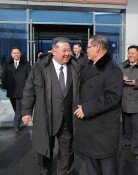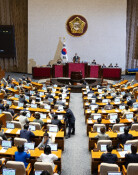[Opinion] Railroad Renaissance
Set against the backdrop of an old train station, the American film Station Agent portrays how complete strangers meet and develop friendship. The Japanese film Poppoya, also known as Railroad Man, also has a similar sentimental story and looks back on the life of a small-town station master who is about to retire.
The image of train is closely associated with warmth and sentimentalism. In Japan, where there are countless train lines and stations, train otakus, or hardcore train aficionados, are considered one of the three major otakus. Interestingly, there are even some Japanese who perform only the melodies played right when the train departs or right before an announcement is made in the train.
The railroad, which has been overlooked all round the world, is enjoying the era of renaissance. According to Korea Railroad Corp. (KORAIL), the number of train passengers has jumped to over 9 million in June, the highest ever since June 2001. In the United States, each Americans average travel distance merely accounted for 7.3 percent of that of a Japanese person, largely due to lack of investment in facilities and a fierce competition with the domestic airline networks and highways. However, the long disregarded industry is now stealing the spotlight in the stock market. Warren Buffett, CEO of U.S. holding company Berkshire Hathaway, has also acquired 11 percent of stocks from Burlington Northern, becoming the railroad companys biggest shareholder. In the United Kingdom, the railroad freight transportation has jumped nearly 70 percent over the past decade. This is the biggest increase since World War I.
The United States, Russia, China and India are competitively rushing to the railroad industry, which was once a declining industry. This is largely because the cost-effectiveness of the railroad service. A train can transport freight at one third of a cargo trucks fuel costs. In terms of the speed of delivery, some reports suggest that the railroad is four to eight times faster than the road. Trains are also eco-friendly transportation as carbon dioxide emissions are much less than those of cars. A diesel train produces only 45 percent of the automobiles per capita carbon dioxide and 27 percent of that of short-haul flights.
As the cross-country canal project has been postponed indefinitely, it is time for the government to divert its efforts and budget to the railroad. Canals on a peninsula, which is surrounded by the ocean, lack efficiency, when it comes to logistics. Korea has been negligent in making investment in the railroad since 1970s, in contrast to its investment in the road. We can no longer talk about solving the two of the biggest challenges the world has encountered -- high oil prices and global warming -- without mentioning the railroad and nuclear power. The government should expedite the construction of the Gyeongbu High Speed Railroad, as well as Honam and East-West High-speed Railroads, which only have rough drafts.
Editorial Writer Huh Moon-myung (angelhuh@donga.com)







